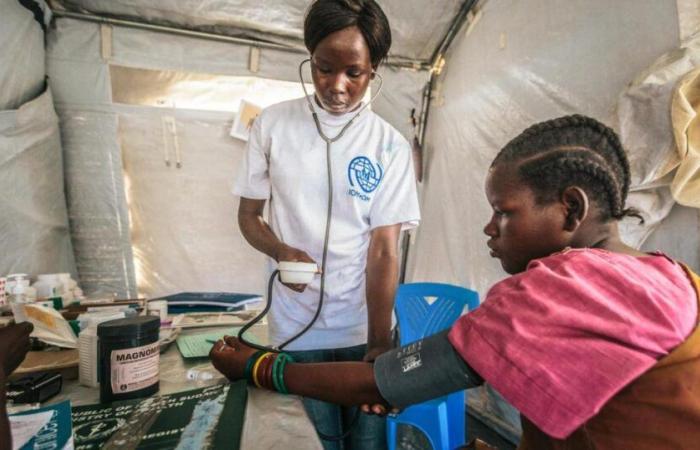
ColourNovember 5, 2024 – The International Organization for Migration (IOM) has intensified its interventions in the face of a cholera epidemic which broke out in Colourin Upper Nile State, which serves as the main point of arrival for hundreds of thousands of people fleeing the ongoing conflict in Sudan. Colour also houses a transit center where more than 13,000 newly arrived people are housed.
The Ministry South Sudan Health Department declared outbreak after six cases have been confirmed at Colour. To date, the situation remains critical with 59 suspected cases reported by the Ministry of Health of South Sudan.
“The response team on the ground is working around the clock to ensure those affected receive the necessary care and support, while preventative measures are implemented to limit the spread,” said Aaron AdkinsIOM South Sudan Emergency Response Coordinator.
The flow of displaced people arriving in crowded conditions with limited access to clean water and sanitation has increased the risk of cholera transmission in transit centers and host communities. In response to this public health emergency, IOM has implemented comprehensive emergency measures in close coordination with local health authorities and partner organizations.
More than 684,000 people fleeing conflict in Sudan have entered through the Sudanese port of entry Something has Colour. IOM has established a presence there where it supports surveillance activities and the identification of suspected cholera cases. IOM-trained clinicians are stationed at the point of entry and transit centers Colour and Malakal to improve rapid detection and reporting of cases. Recognizing the importance of immediate treatment, IOM has established Oral Rehydration Points (PROs) at the POE clinic and transit center to provide life-saving hydration to affected individuals.
Risk communication is a critical aspect of IOM’s interventions, with ongoing efforts to educate the community on cholera prevention, the importance of hygiene practices, and the need for early treatment. This awareness allows individuals to take proactive steps to preserve their health.
In addition to these efforts, IOM has strengthened local capacity by training clinicians in case definition and identification, as well as the use of rapid diagnostic tests. These trainings are crucial for the detection and rapid response to cholera cases, ensuring that patients receive effective and timely care.
IOM interventions also focused on water, sanitation and hygiene (WASH) initiatives to stem the spread of the disease. This includes ensuring that people receiving transport assistance to their destination (Onward Transportation Assistance, OTA) are made aware of cholera control protocols in order to minimize risks during their transit.
The epidemic at Colour represents a serious threat to vulnerable populations arriving from Sudan, who are already facing serious difficulties. IOM’s multifaceted interventions, in collaboration with other humanitarian organizations and under the coordination of the Public Health Emergency Operations Center, aim to contain the outbreak and protect those most at risk.
IOM remains committed to supporting the Government of South Sudan and working with partners to provide essential assistance, protect public health and build resilience to Colour and surrounding areas. Continued support from the international community is essential to maintain and expand these critical interventions as the situation evolves.
For media inquiries, please contact:





